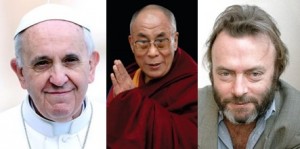Words matter. Even the smallest of words. Let me give you a recent example. Last week Pope Francis suggested Donald Trump’s stance on immigration was inconsistent with Christian values. Specifically the Pope said,
A person who thinks only about building walls, wherever they may be, and not building bridges, is not Christian.
As I re-read this comment, I noticed the word “a” had been omitted. Francis could have said, Trump does not strike me as “a” Christian. Instead he related it to the universal values of compassion and justice taught and practiced by Jesus in the Christian tradition as well as rabbis and prophets in all of the world’s other major religions. How refreshing.
Was this the beginning of an ecumenical movement in which we could all begin to focus on common values instead of the spiritual path through which we adopt these values? I quickly realized it was not the beginning, but a confirmation of efforts by other spiritual leaders in search of similar outcomes. In 2012, the Dalai Lama shared a similar message.
All the world’s major religions, with their emphasis on love, compassion, patience, tolerance, and forgiveness can and do promote inner values. But the reality of the world today is that grounding ethics in religion is no longer adequate. This is why I am increasingly convinced that the time has come to find a way of thinking about spirituality and ethics beyond religion altogether.
But how about those who do not believe the source of compassion and justice depends on the existence of any deity? For this perspective, I turned to Christopher Hitchens, the late, devout atheist who argued he did not need a god to tell him what was right or wrong. In his book God Is Not Great: How Religion Poisons Everything, Hitchens states,
Human decency is not derived from religion. It precedes it.
Who could ask for a more diverse trio of compatriots? This is a trinity I would hope everyone can believe in.
For What It’s Worth.
Dr. ESP
